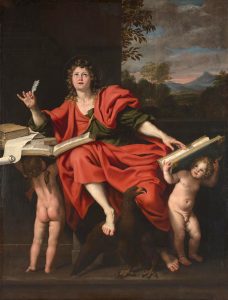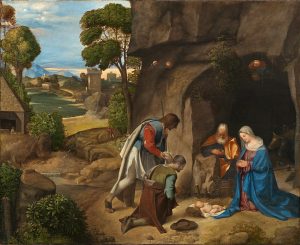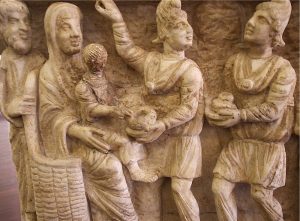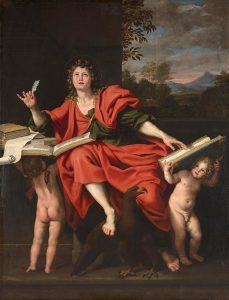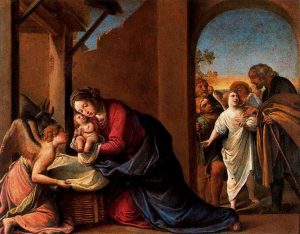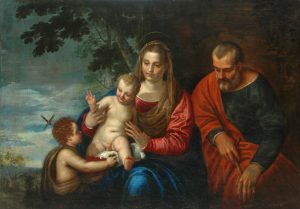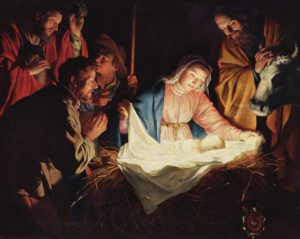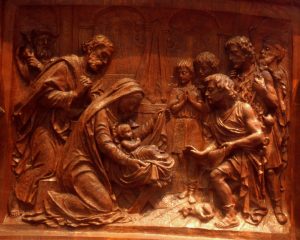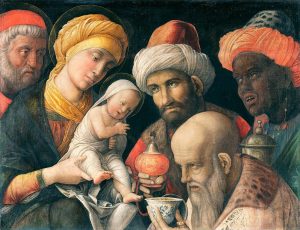Thoughts on Sunday’s Lessons for Jan. 4, 2026 (Christmas 2)
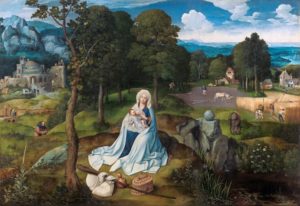
Rest on the Flight into Egypt (1518-1520). Oil painting on panel by Joachim Patinir (1480-1524). Museo del Prado, Madrid. (Click image to enlarge.)
First Reading: Jeremiah 31:7-14
The story of Joseph, Mary, and Jesus seeking refuge in faraway Egypt – one of three Gospels available for our use this Sunday – offers us rich food for thought in our own troubled times, when refugees look for safe places around the world. Our readings for the Second Sunday of Christmas offer comfort for those who put their faith in God while they face fear, poverty, and oppression. As our first reading, we turn to the prophet Jeremiah, speaking to Israel in exile. The people have been forced to migrate to their enemy’s capital, leaving behind the ruins of Jerusalem and the Temple, yet they trust that God one day will lead them back home, turning their sorrow into gladness, their mourning into joy.
Psalm: Psalm 84
In poetic themes and metaphors that closely echo Jeremiah’s verses, the Psalmist offers a hymn of trust and praise in a loving God who will protect the people and lead them back home. God will provide clear water in desolate places, protect them in the heights, and serve as their shield against the burning sun and raging enemy, the Psalmist sings. And, home at last, they will know the joy of worshiping in God’s Temple, lavished with God’s grace and glory.
Second Reading: Ephesians 1:3-6, 15-19a
Paul offers the people of the church in Ephesus a promise similar to the one we heard in last week’s reading from Galatians: They – like all of us – are adopted as God’s children through Jesus, and in this way we are freely given God’s grace. Like migrants received with a loving embrace in their new land, the people of God receive a glorious inheritance of great spiritual riches that provides hope.
The Lectionary offers a choice of three Gospels for the Second Sunday of Christmas: Matthew’s account of the Holy Family’s escape to Egypt from King Herod’s wrath; Luke’s story of the boy Jesus in the Temple; and Matthew’s narrative of the visit of the wise men from the East.
Gospel: Matthew 2:13-23
Think about the sad and sometimes terrifying images of refugees that have filled the news in recent years: Parents and their children risk their lives in the long, dangerous journey to El Norte, only to face rejection and deportation. African immigrants drown in capsized ships on the Mediterranean. Life as a refugee can be hard, frightening, sometimes fatal. Now think about Joseph and Mary in Matthew’s Gospel: They are terrified, running away to a foreign land to escape the threat of their own baby’s death at the hands of an angry King Herod. What parents would not go to such an extreme to protect their precious child? And what child, living through such an experience, would not forever remember to care for the widow, the orphan, and the stranger?
Gospel: Luke 2:41-52
The gospels tell us almost nothing about Jesus’s childhood and youth. This intriguing gap is filled by this short, fascinating story that appears only in Luke’s Gospel. Twelve-year-old Jesus disappears while the family is in Jerusalem, to the horror of Joseph and Mary, who find him three days later in the Temple, impressing the elders with his intelligent discussion. The child reassures his frantic parents, declaring that his place is in his “Father’s house,” the Temple. In the next chapter, in Luke’s account of the baptism of the 30-year-old Jesus by John the Baptist in the Jordan, we will hear the voice of God announce that Jesus is God’s beloved Son.
Gospel: Matthew 2:1-12
One of the most memorable Christmas stories, told only in Matthew’s Gospel, tells of the Magi, wise men from the East who followed a shining star to Bethlehem, the village that the prophets foretold as the birthplace of the Messiah. Matthew doesn’t actually say that there were three of them, or that they were kings. They came, following the star, the Gospel tells us. They bore gifts. They knelt and paid homage to baby Jesus as if he were a king … and then they thwarted evil Herod’s plan to find and kill the baby by heading home via another road, avoiding a return through Jerusalem.

